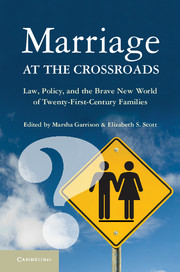Book contents
- Frontmatter
- Contents
- Contributors
- Acknowledgments
- Introduction
- Part I History, Demographics, and Economics – Multiple Perspectives on Families
- Part II Empirical Research on Family Change
- 6 Institutional, Companionate, and Individualistic Marriages
- 7 Marriage and Improved Well-Being
- 8 Fragile Families
- 9 Should Marriage Matter?
- Part III Family Policy and Law for the Twenty-First Century
- Comments
- Index
- References
7 - Marriage and Improved Well-Being
Using Twins to Parse the Correlation, Asking How Marriage Helps, and Wondering Why More People Don't Buy a Bargain
Published online by Cambridge University Press: 05 November 2012
- Frontmatter
- Contents
- Contributors
- Acknowledgments
- Introduction
- Part I History, Demographics, and Economics – Multiple Perspectives on Families
- Part II Empirical Research on Family Change
- 6 Institutional, Companionate, and Individualistic Marriages
- 7 Marriage and Improved Well-Being
- 8 Fragile Families
- 9 Should Marriage Matter?
- Part III Family Policy and Law for the Twenty-First Century
- Comments
- Index
- References
Summary
Married adults are better adjusted than never married, remarried, and – especially – separated/divorced adults as indexed by a wide variety of measures including: (1) psychological adjustment, notably greater happiness/subjective well-being (Gove et al. 1983; Johnson & Wu 2002), less depression (Pearlin & Johnson 1977; Wade & Pevalin 2004), and less substance use (Power et al. 1999); (2) social relationships, for example, more frequent sex (Laumann et al. 1994; Pedersen & Blekesaune 2003), experiencing less violence inside or outside of the relationship (Waite & Gallagher 2000), and having better-adjusted children (Emery 1999); (3) finances, as evident in higher family income (Duncan & Hoffman 1985) and lower perceived economic stress (Pearlin & Johnson 1977); and (4) physical health, as indexed by markers, such as better self-ratings of health (Hughes & Waite 2009), less chronic disease (Dupre & Meadows 2007), and greater longevity (Sbarra & Nietert 2009). The descriptive benefits of marriage are so pervasive, in fact, that many commentators and policies encourage marriage as a prescriptive solution for improving individual – and societal – well-being (McLanahan et al. 2005; Waite & Gallagher 2000). Most notable in this regard is the federal government's $1.5 billion campaign to promote marriage initiated under the George W. Bush administration.
Marriage promotion typically, but by no means universally, is linked to the political right. Still, the potential benefits of marriage are of widespread, popular interest. For example, a recent New York Times Magazine (April 18, 2010) article posed the question, “Is Marriage Good for Your Health?” Hundreds of studies suggest that the answer to this question is “yes.” The so-called marriage benefit is a reliable empirical finding, one replicated by many independent research groups, that generally remains consistent across time and cultures. In fact, a major, recent scholarly review concluded that future research should move from asking “whether” marriage benefits mental and physical health to outlining “when” and “how” the benefits of marriage accrue (Carr & Springer 2010).
- Type
- Chapter
- Information
- Marriage at the CrossroadsLaw, Policy, and the Brave New World of Twenty-First-Century Families, pp. 126 - 141Publisher: Cambridge University PressPrint publication year: 2012
References
- 4
- Cited by



